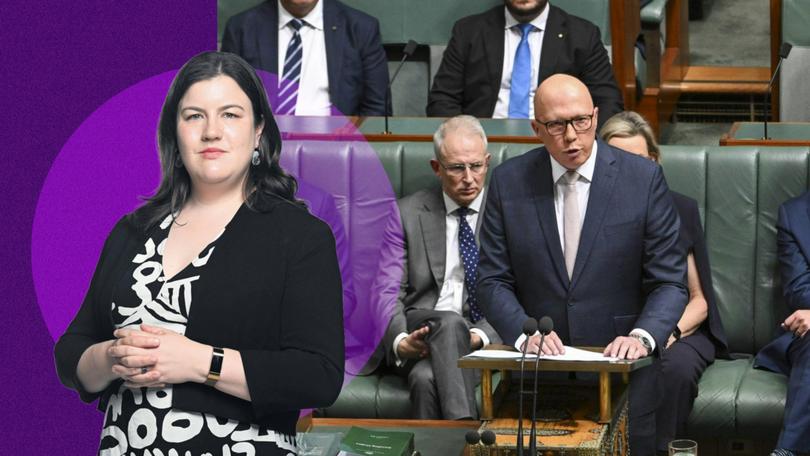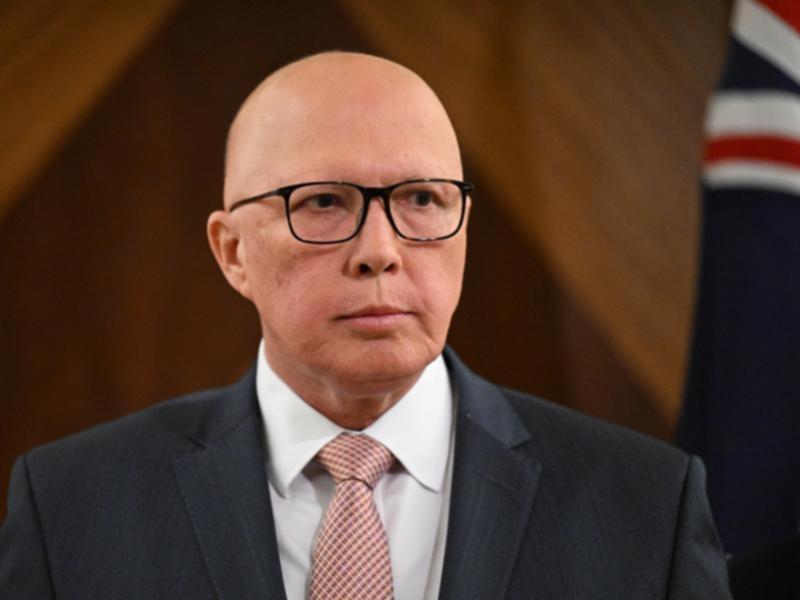KATINA CURTIS: Peter Dutton’s anti-migration policy could torpedo the Australian economy
KATINA CURTIS: Peter Dutton has spent the week since his budget reply making scapegoats of migrants with the message that too many people are coming into the country and forcing Australians out of their homes.

Peter Dutton is not so much wielding a dog whistle as standing at the dog park with a vuvuzela.
The Opposition Leader has spent the week since his Budget reply making scapegoats of migrants with the message that too many people are coming into the country and forcing Australians out of their homes.
That’s not even exaggerated for dramatic effect.
Sign up to The Nightly's newsletters.
Get the first look at the digital newspaper, curated daily stories and breaking headlines delivered to your inbox.
By continuing you agree to our Terms and Privacy Policy.Take this from Friday: “We can’t have rental accommodation and housing taken up by non-citizens when our own citizens can’t find a roof to put over their head.”
Or Monday: “You’ve got a Treasurer at the moment who’s willing to sacrifice homes for Australians because he’s got a migration program to prop up a failed Budget… The Government is forcing people out of homes.”

And Tuesday: “Having international students living in homes that should be rented by Australians or purchased by Australians is not acceptable in a tight market for housing.”
Are you scared yet?
There are a few nods to the importance of multiculturalism and assertions it’s not that they don’t like migration — just the way Labor is handling it.
Deputy leader Sussan Ley even started a speech to small business owners with: “When I first arrived in Australia as a migrant from the Middle East…”
(Her father was a British spy based in the United Arab Emirates, and she attended boarding school in England before landing in Toowoomba.)
This demonisation of house-snatching foreigners is all the more inflammatory when you consider that Coalition MPs have spent many months talking up the need for social cohesion and accusing the Government of being divisive over its stance on the Israel-Gaza conflict.
The best measure of how social cohesion is going in Australia is the Scanlon Institute’s annual survey, which last year found people’s sense of belonging in the country was at a record low of 48 per cent.
One-third said migration was too high — a sharp spike upwards in a measure which has been falling since 2018 — and there was an increase in the number of people agreeing immigrants took jobs away.
But at the same time, the vast majority of people said immigrants were good for the economy and improved Australian society.
ANU demographer James O’Donnell, the lead investigator on the Scanlon work, says a general “anti-migrant sentiment”, especially when debates are amplified through media, harms people’s sense of belonging with flow-on impacts for their trust in governments and others.
“(It’s) that really important, I guess, psychological underpinning for everything we do and how we engage in our communities,” he said.
There are broad social benefits from being a country built on migration as well as economic ones, as CEDA senior economist Andrew Barker noted to this column.
“We have to keep recognising that and pointing that out … rather than using migrants as a scapegoat,” he said.
While the Coalition’s rhetoric on migrants has been inflammatory, its numbers on how and how much it will cut the intake are flimsy.

Dutton used his Budget reply to lay out a cut to permanent migration, then a radio interview the next day to specify a different cut to net overseas migration (the number of people arriving into the country offset by those who depart).
Shadow treasurer Angus Taylor further muddied the waters at the National Press Club when he appeared to name yet another level of cuts.
Pressed three times to explain what the policy actually was, he left every reporter present scribbling calculations and puzzling over his repeated insistences that he had both answered the question and not differed from what his leader had said.
A later additional explanation revealed the policy as: the Coalition will cut the net migration level over the next three years by a quarter below what the Budget forecast, but it will start by slashing nearly 40 per cent in the first year, meaning the level can rebound thereafter.
The thing no one has yet been able to explain is how — when the Government is already struggling to halve annual migration to about 260,000 people — the Coalition will cut it by a further 100,000.
With promises to prioritise tradies to get those houses built, Dutton’s remaining options are limited.
Do you say no more nurses, GPs or aged care workers? Do you ban all backpackers who provide much-needed labour to farmers and the hospitality sector? Do you declare Kiwis persona non grata and bar them from staying more than 12 months?
Or do you ravage the $50 billion international education sector — Australia’s largest non-resources export — and send universities and private educators bankrupt?
Never mind the housing sector — for the future prosperity of Australia, that’s a scary thought.

